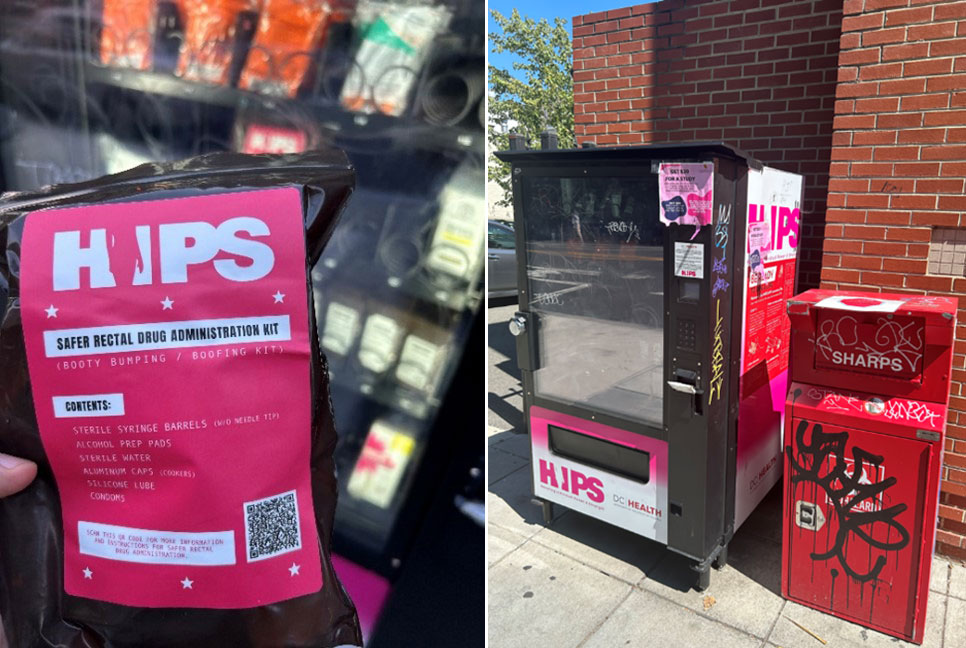On 7th Street in northwest Washington, D.C., within sight of a children’s playground, stands a vending machine sponsored by a group called “HIPS” and the city’s health department. The vending machine does not provide soda or sweets. Instead, it dispenses syringes and other pieces of drug paraphernalia.
The instructions on the machine claim that a special code is required to access these products. But after punching a few numbers, I became the proud owner of a taxpayer-funded, HIPS-branded “Safer Rectal Drug Administration Kit,” or “Booty Bumping/Boofing Kit.”
A QR code on the package took me to a page describing the rectal administration process. The document insists that booty bumping is “usually quick and easy,” delivering “a fast hit and rush that’s usually stronger than smoking.” It also reminds users to “poop beforehand if you haven’t recently so the drugs get absorbed.”

These machines are the latest experiment enacted in the name of “harm reduction.” The movement’s proponents once supported the one-to-one exchange of dirty and clean needles to stop the spread of diseases such as HIV and sought to bring hardcore addicts into contact with social workers. Nowadays, they support the distribution of free meth pipes, booty bumping kits, and other drug paraphernalia to almost anyone who asks. Instead of reducing harm or enabling treatment, the movement’s advocates are using taxpayer funds to subsidize addiction.
Local, state, and federal governments are arrayed in support of harm reduction. The D.C. government’s request for applications for the vending-machine project, for example, notes that the project’s $150,000 award is tied to a federal grant. The document instructs applicants to “center the voices of people who use” drugs, and work with “informal leaders” in this “community”—among whom, presumably, are drug dealers—to “support continuous quality improvement.” The request emphasizes that the program is based on the city’s commitment to “health equity” and “social justice.”
Official reports or local media stories about these machines tend to focus on their provision of NARCAN (an opioid overdose spray, crucial to preventing or reversing overdoses) and fentanyl test strips. Most such announcements downplay or ignore the distribution of syringes and ”drug snort kits.” Though D.C. did not announce that its vending machines include pipes for crack or other drugs, HIPS advertises that it provided over 5,000 “safer smoking kits” last year, a type of package that generally include pipes. I haven’t found any materials that mention the machines’ booty bumping kits.
The vending-machine model has spread like wildfire. In 2017, Nevada became the first state to host a syringe-dispensing machine. Harm-reduction machines, often dispensing more than just Narcan or needles, began springing up in cities across the country after the pandemic: Cincinnati in 2021, Cleveland and Detroit in 2022, and New York City and Milwaukee in 2023. This year, Maryland’s Anne Arundel County installed seven of these machines, and New York State established several more. A representative from Shaffer Distributing estimated last year that the firm had sold 200 or more harm-reduction vending machines, placed everywhere from public libraries to post offices to college campuses.
Cities have been inundated with paraphernalia. One addict in New York complained that “you can’t even sell” the vending machines’ helpings, because existing “programs give you all that stuff” for free. In Vancouver, drug-treatment workers have complained that kids have wound up possessing medical opioids first dispensed by the city’s vending machines. Some machines carry condoms, lubricant, and feminine hygiene products. Las Vegas’s vending machines, for instance, are stocked with “hormone injection kits” for transgender-identifying people and bodybuilders.
Most Americans are unaware of the harm-reduction movement’s advance and the ways in which taxpayers support drug abuse. Governments today give special priority to drug abusers in housing and other programs, and some marshal more resources to those addicted to drugs than those who stayed clean. Taxpayer-funded drug supplies distributed through vending machines would have been unimaginable just a few years ago. Today, it is becoming commonplace.
Photo: Rapeepong Puttakumwong / Moment via Getty Images
City Journal is a publication of the Manhattan Institute for Policy Research (MI), a leading free-market think tank. Are you interested in supporting the magazine? As a 501(c)(3) nonprofit, donations in support of MI and City Journal are fully tax-deductible as provided by law (EIN #13-2912529).
This post was originally published on this site be sure to check out more of their content.






